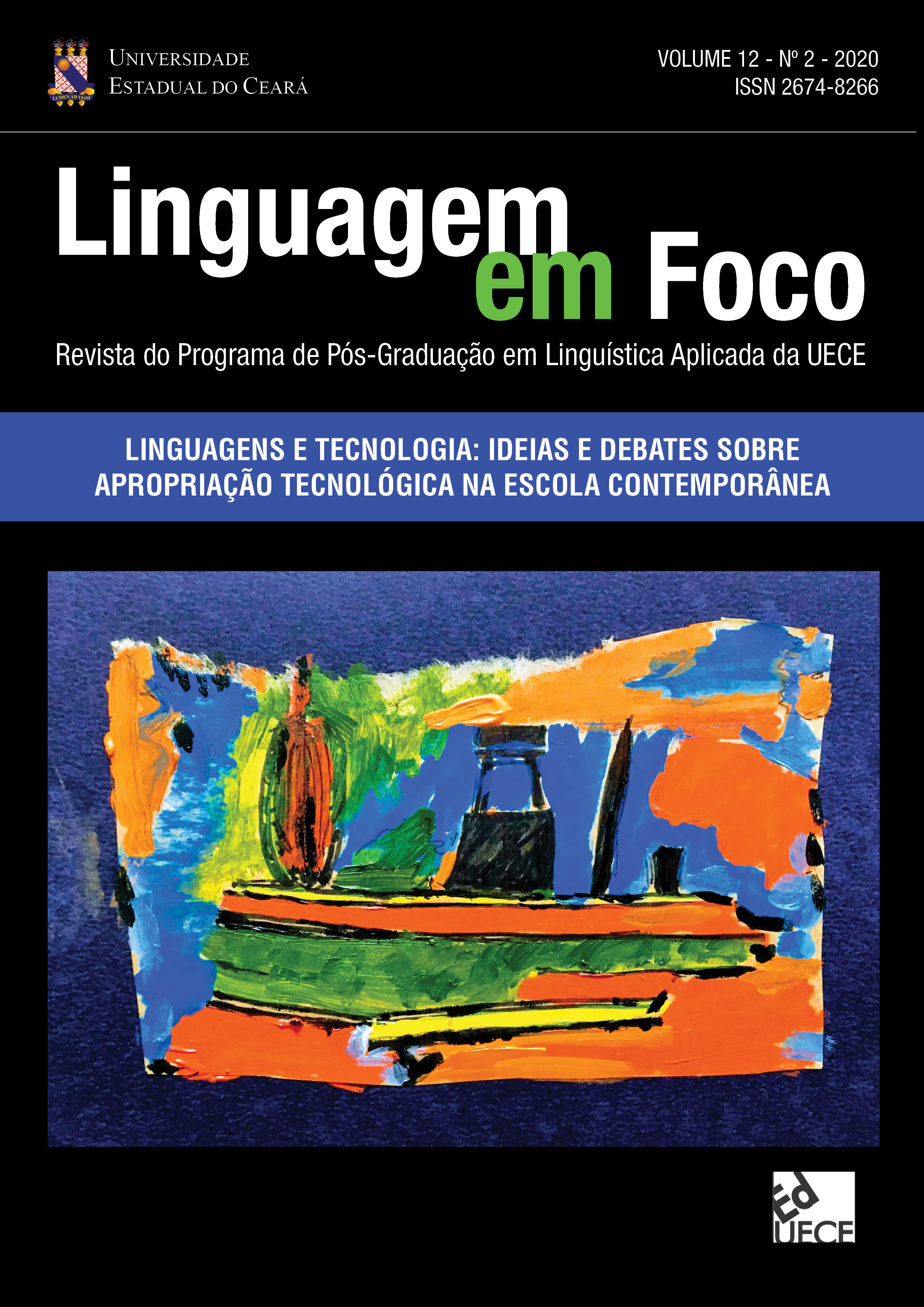Digital technologies and teacher education
Implications to the teaching practices of teacher educators from Letras courses
DOI:
https://doi.org/10.46230/2674-8266-12-4054Keywords:
Teacher education, Digital technologies, Teacher educators in Letras coursesAbstract
This article aims to investigate the implications of digital technologies in teaching practices of teacher educators from Letras courses. This research, then, has a qualitative approach and has as corpus information from the application of a structured interview with educators who teach undergraduate Letras courses at a public university in the countryside of Paraiba. In order to anchor the discussions and analyses proposed, we weave some ideas about contemporary teacher education (BEHERENS, 2007; CELANI, 2002; FREIRE; LEFFA, 2013; PERRENOUD, 2002, among others), and about the language teacher education in the face of new digital technologies (BALADELI, 2013; BOERES, 2018; IMBERNÓN, 2011; MARZARI, 2014; MARZARI; LEFFA, 2013). The research brings evidences that the use of digital technologies in their teaching practices implies changes in their pedagogical actions and in the process of teaching and learning languages. It also highlights the need to use such technologies for specific purposes to make teaching more promising alongside with the understanding that technological devices are tools that help teaching work.
Downloads
References
ANDRÉ, M. Etnografia da prática escolar. Campinas, SP: Papirus, 1995.
BALADELI, A. P. D. Desafios na formação continuada de professores de inglês para o uso pedagógico da internet. Jundiaí: Paco Editorial, 2013.
BEHRENS, M. O paradigma da complexidade na formação e no desenvolvimento profissional de professores Universitários. Educação. Porto Alegre/RS, ano XXX, n. 3 (63), p. 439-455, set./dez. 2007.
BOERES, S. O letramento e a organização da informação digital aliados ao aprendizado ao longo da vida. RDBCI: Revista Digital de Biblioteconomia e Ciência da Informação. Campinas, SP, v. 16, n. 2, p. 483-500, mar. 2018.
CELANI, M. A. A. Um programa de formação contínua. In: CELANI, M. A. A. Professores e formadores em mudança: relato de um processo de reflexão e transformação da prática docente. Campinas, SP: Mercado das Letras, 2002. p. 18-35.
CHESTERMAN, A.; WILLIAMS, J. The Map: A Beginner’s Guide to Doing Research in Translation Studies. Manchester: St. Jerome, 2009.
DIONÍSIO, A. P. Análise da conversação. In: BENTES, A.; MUSSALIN, F. (org.). Introdução à linguística: domínios e fronteiras. vol. 2. São Paulo: Cortez, 2006. p. 69-99.
FREIRE, M. M.; LEFFA, V. J. A auto-heteroecoformação tecnológica. In: MOITA LOPES, L. P. Linguística aplicada na modernidade recente. São Paulo: Parábola, 2013. p. 59-78.
IMBERNÓN, F. Formação docente e profissional: formar-se para a mudança e incerteza. 9. ed. São Paulo: Cortez, 2011.
LOPES, C. R. Repensando os saberes: mudanças nos paradigmas epistemológicos e a formação de professores de língua estrangeira. Revista Brasileira de Linguística Aplicada, v. 13-3, p. 941-962, 2013.
MARZARI, G. Q.; LEFFA, V. J. O letramento digital no processo de formação de professores de línguas. Tear: Revista de Educação Ciência e Tecnologia, Canoas, v. 2, n. 2, p. 1-18, 2013.
MARZARI, G. Q. Repensando a sala de aula a partir do letramento digital. Entretextos, Londrina, v. 14, n. 2, p. 07-25, jul./dez. 2014.
MORIN, E. Os sete saberes necessários à educação do futuro. Tradução Catarina Eleonora F. da Silva et al. 2. ed. São Paulo: Cortez/UNESCO, 2000.
NASCIMENTO, A. K. O. O Ensino de língua inglesa sob o viés dos letramentos digitais. In: ZACCHI, V. J.; STELLA, P. R. (org.). Novos letramentos, formação de professores e ensino de língua inglesa. Maceió: EDUFAL, 2014. p. 53-73.
PEREIRA, J. E. D. Formação de professores: pesquisa, representações e poder. 2. ed. Belo Horizonte, MG: Autêntica, 2007.
PERRENOUD, P. et al. As competências para ensinar no século XXI: a formação dos professores e o desafio da avaliação. Tradução Cláudia Schilling e Fátima Murad. Porto Alegre: Artmed, 2002.
WALLACE, M. Training foreign language teachers: a reflective approach. Cambridge: Cambridge University Press, 1991.
Published
How to Cite
Issue
Section
License
Authors who publish in Linguagem em Foco Scientific Journal agree to the following terms:
- Authors retain the copyright and grant the journal the right of first publication. The articles are simultaneously licensed under the Creative Commons Attribution License which allows sharing the work with an acknowledgement of its authorship and initial publication in this journal.
- The concepts issued in signed articles are the absolute and exclusive responsibility of their authors. Therefore, we request a Statement of Copyright, which must be submitted with the manuscript as a Supplementary Document.
- Authors are authorized to make the version of the text published in Linguagem em Foco Scientific Journal available in institutional repositories or other academic work distribution platforms (ex. ResearchGate, Academia.edu).





























